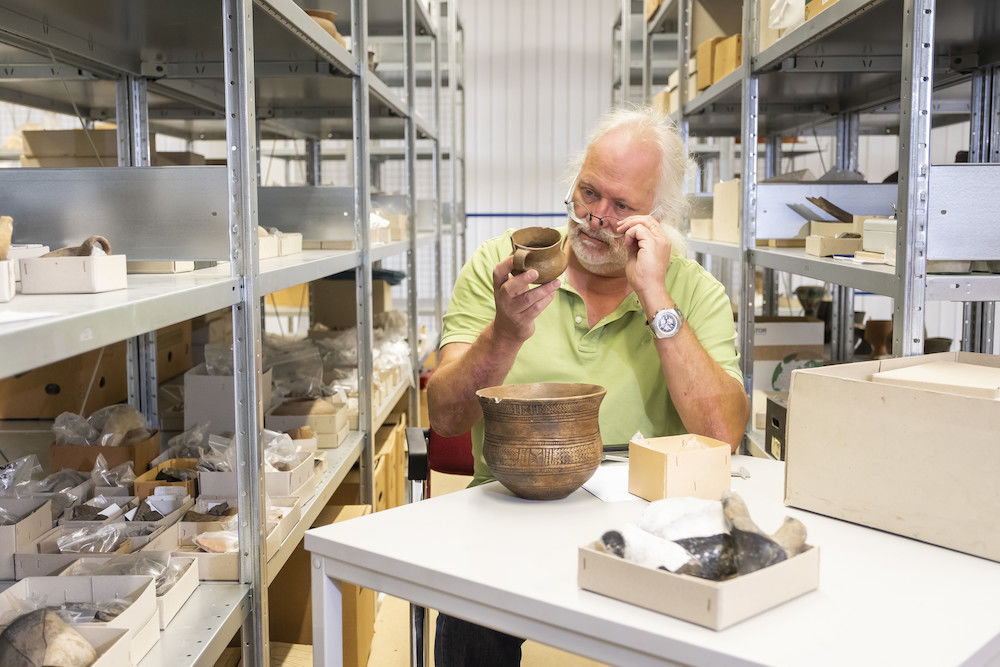Early networks

In the first half of the second millennium B.C. people were more restless than once believed. “They had extensive networks, contracts to the Aegean, to Scandinavia, and to the British Isles,” explains Professor François Bertemes of the Institute for Art History and European Archaeology. “We used to think that people back then lived in a sort of regional bell jar,” says the archaeologist. That thinking has been overhauled. Now research is being directed towards identifying international ties.
A key finding on the lives of people living at that time stems from years of research on the context of Nebra Sky Disc. From 2004 to 2012, Bertemes was spokesperson and coordinator for a research group of the Deutsche Forschungsgemeinschaft (DFG). In the context of this work, archaeologists set up a central digital archive for all of the finds in Central Germany dating back to this period; thousands and thousands come from various museums. This has enabled us to better understand where people settled and how settlement landscapes have changed, says Bertemes. His team concentrated on excavating ring ditches in the region. They discovered that four of them were built in the Únětice culture, the same time period as the Sky Disc. DFG funds were used to excavate the ring ditch at Pömmelte (Salzlandkreis District), what we now know to be a supra-regional sacred site. Established rituals, presumably the sacrificing of women and children, burials and depositions: “We were able to find out a lot about the ideology of the time and the beliefs of the people.” According to Bertemes, excavations by other archaeologists have also shown that there were no castles or similar fortifications in the region at that time. “This points to very tightly organised political systems” in which elites felt safe.
The Sky Disc provided a starting point for extensive research work and was therefore worth its weight in gold, not only because of the actual gold on it, which came from as far away as Cornwall. It should be noted that gold at that time was not only viewed as an indication of prestige or social rank. It was symbolic too. According to Bertemes, the sun played a major role in the lives of the Indo-Germanic people - who are believed to have lived in Central Germany during the Early Bronze Age - and therefore gold was used to symbolise the sun.
There is much more research left to do on the Sky Disc. A 4,000-year-old settlement was just discovered near the sacred site at Pömmelte. Scientists, including those from MLU, are also investigating how the astronomical knowledge depicted on the disc got from Egypt and Mesopotamia to Central Europe. Excavations in Turkey are due to be completed in 2019, and an initial expedition has just taken scientists to Italy.
Professor François Bertemes
Institute for Art History and European Archaeology
Telephone: +49 345 55-24059
Mail: francois.bertemes@praehist.uni-halle.de
Further articles
Gold fever
Researchers solve mystery surrounding the Nebra Sky Disk – with a precious metal playing a decisive role in more than just the famous Bronze Age discovery. Read more
The trail leads to Cornwall
The Nebra Sky Disc was discovered 20 years ago. Researchers from Halle have been studying the spectacular find – including its 32 grams of inlaid gold. Read more
The tiny philosopher’s stone
The bacterium C. metallidurans is most notable for its perseverance, thriving in areas contaminated with heavy metals. It has attracted the attention of a research group in Halle, led by Professor Dietrich H. Nies, but for an entirely different reason: it produces microscopic gold nuggets. Read more
